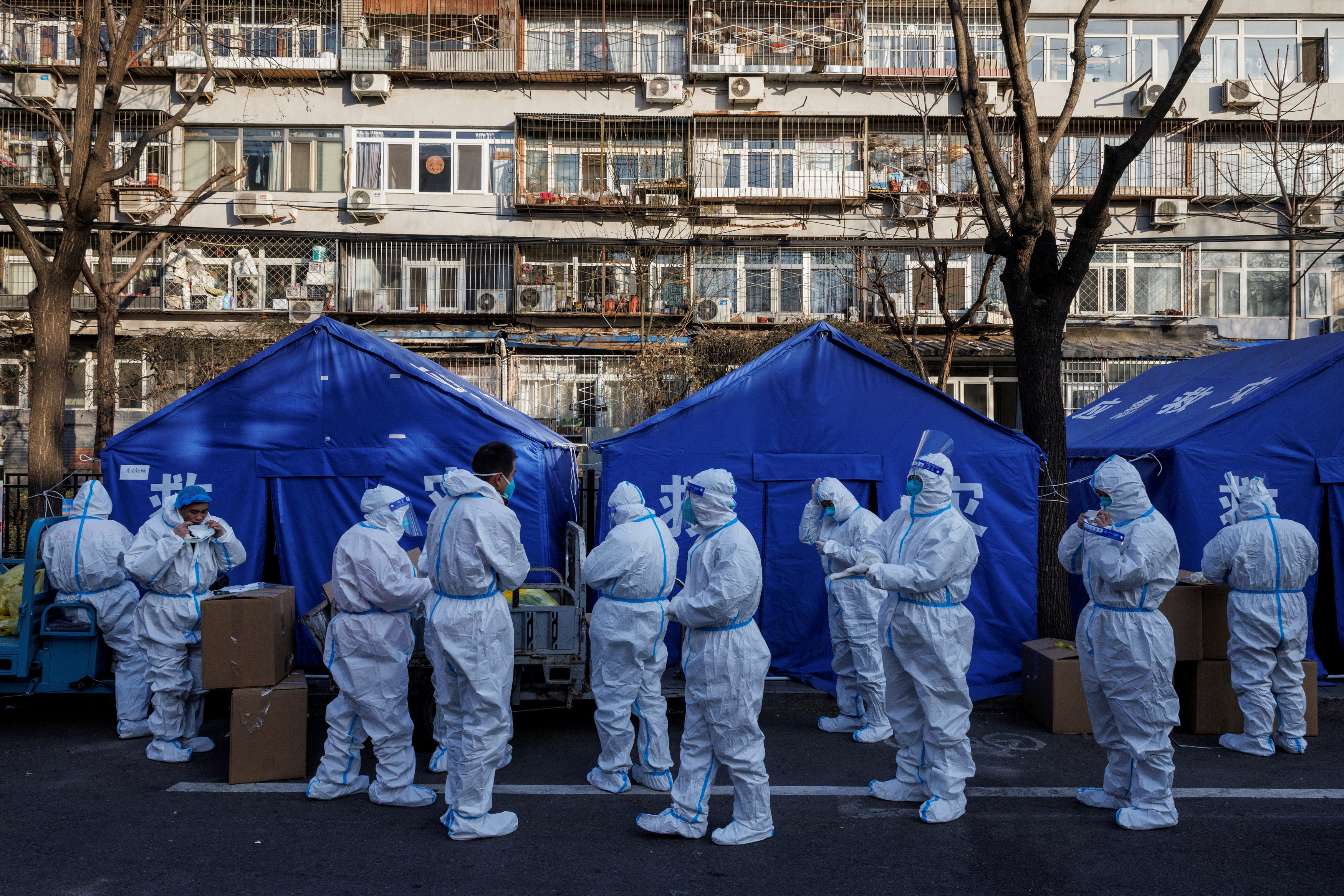Beijing, China – Zhou Jing, a 36-year-previous small business operator in China’s Hebei province, is relieved that Beijing has started to unwind its severe “zero-COVID” system.
Right after using demanding safeguards to stay clear of COVID-19 for the past a few decades, Zhou ultimately analyzed favourable for the virus before this thirty day period as instances surged nationwide.
As opposed to thousands and thousands of Chinese impacted by the virus before in the pandemic, Zhou was ready to get well at household as an alternative of at a quarantine facility.
Previously this month, Beijing introduced it would “optimise” its COVID insurance policies by making it possible for moderate circumstances to quarantine at property, as very well as restricting lockdowns, scrapping mass testing, and lifting curbs on domestic journey.
Zhou was glad to be ready to encounter the ailment surrounded by her cherished kinds, and she is happy to know she will not be restricted from performing day to day errands like likely to the grocery store in the long term.
Nevertheless, Zhou, who runs a small tour company, is not possible to travel far outside of her dwelling whenever before long.
For Zhou, global travel — a thing she did at minimum two times a year in advance of 2020 — is off the table for the foreseeable future thanks to the hazard of the virus, even if the borders are reopened in the coming months or months.
“I know you can get COVID-19 any where now, but at the very least here in China, I’ll be with my loved ones,” Zhou advised Al Jazeera. “Here, the existing variant [Omicron] appears to be far more steady. If I go overseas, I concern the virus could mutate.”
Zhou is not on your own in getting apprehensive.

In a survey of 4,000 Chinese individuals carried out by consultancy Oliver Wyman in late October, much more than 50 percent of respondents explained they program to set off journey abroad, even if the borders reopen tomorrow, with worry of infection cited as the best worry.
“People have turn out to be cautious,” Imke Wouters, a retail and purchaser products husband or wife at the consultancy, instructed the Reuters information company. “So even when they can travel, we don’t consider they will occur back ideal absent.”
This sort of nervousness could pose a obstacle to the worldwide tourism market’s nascent recovery from the pandemic, which has been held back by China’s ongoing border closures. China’s population expended $288bn on intercontinental travel in 2018, approximately 1-quarter of the international investing on tourism.
Other facts suggests that Chinese may be keen to journey so prolonged as the govt lifts its myriad limitations on shifting in and out of the country.
Dragon Path Worldwide, which focuses on the Chinese outbound vacation market, surveyed 1,003 men and women on the mainland involving November 7 and 20 and found that more than fifty percent of the respondents would head overseas in just one particular 12 months of reopening.
That study found that “quarantine, demanding insurance policies, and inconvenience,” fairly than worry of the virus, have been the major obstacles to travel, with 60 p.c of respondents expressing hope quarantine-on-arrival will be relaxed.
Lily Zhang, a modest organization proprietor in Tianjin, said she was ready to journey solo abroad and do company with global customers in 2023. But she said she is much less self-assured she will be in a position to travel with her family, specially due to the fact her spouse returned to Tianjin just last month immediately after almost a few many years of remaining stranded in the Philippines.
“I do not thoughts getting strike by COVID-19 any more, even if I get it from abroad,” Zhang instructed Al Jazeera. “But it would be hard if our youngsters become ill due to the fact it would turn out to be an extra duty. We hope to be apparent about the guidelines upon arriving so we can make a decision to vacation as a family.”
Simon He, who is learning for a postgraduate degree in Denmark, explained he has made the decision to return to China in January for an exchange program in Shanghai in spite of the road blocks, which contain 8 days of quarantine upon arrival.
Soon after contracting COVID-19 in Oct, He is confident he can deal with the disease if he receives it at dwelling and is searching ahead to travelling upcoming 12 months.
“Getting COVID-19 is inescapable,” He mentioned. “Although circumstances may well peak for the duration of the Spring Festival holiday getaway, I consider issues will be far better. I will look at travelling additional right after that.”

For some Chinese, domestic travel may perhaps be a substitute for a getaway overseas.
“The modern removal of limitations around interior travel in China bodes incredibly effectively for the restoration of Chinese domestic tourism in the coming months and over and above,” Sienna Parulis-Cook dinner, Dragon Trail’s marketing and advertising and communications director, advised Al Jazeera.
Parulis-Cook dinner claimed Hainan is possible to make a comeback as a domestic getaway, as will Zhangjiakou and other well known “winter tourism” places.
But Josie Chen, a travel agency operator, expects domestic tourism, specially substantial-end luxurious accommodations and ski resorts, will choose a hit from 2023 due to the fact “many Chinese are eager to head out”. Her company’s facts suggests that most affluent Chinese journey to European or North American nations to purchase luxury items.
“Everyone hopes that borders will reopen quickly, but someway, this isn’t very good for our organization,” Chen instructed Al Jazeera. “Domestic journey agencies but yet again have to have to check out the sector and modify our enterprise design if we are to survive yet another yr.”
Parulis-Cook believes that expectations in direction of domestic and outbound journey in China “will change accordingly”.
“The adjust in messaging in China now from officials and the media, to stressing that COVID-19 is really a really delicate disease, must also go a extensive way in the direction of assuaging any virus-related fears about travelling outbound,” she mentioned.
Equally Chen and Parulis-Prepare dinner said Hong Kong is the to start with preference of Chinese travellers they talk with.
China’s border with Hong Kong has been successfully closed considering that early 2020, though the Asian monetary hub last 7 days lifted a three-working day checking interval beneath which intercontinental arrivals ended up prevented from getting into bars and dining places quickly on arrival.
Chen mentioned Southeast Asian countries could see an influx of Chinese travellers following calendar year.
Parulis-Cook explained she expects the five-working day Labour Day holiday in April and May well will be the 1st primary period for outbound visits.
Still, Zhou feels it will not be the appropriate time to travel until eventually coronavirus “is weakened or contained globally”.
“A whole lot of young folks who didn’t travel for a several decades will be keen to get out,” Zhou said. “But my greatest be concerned is when they get ill just after heading abroad. They may appear back with a far more severe variant, and that will just bring about extra problems for all people.”
For other folks like Zhang, lifestyle ought to go on.
“I do not want COVID-19 to bother me any longer,” Zhang explained, incorporating that she hopes Chinese persons discover to live with the coronavirus. “I just dismiss it. My existence is not intended to be only about the pandemic.”